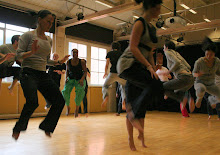1.
The research inside of Porto stems from us, the performers. We began by creating our pallet and then began exploring how we felt within the community which has become Porto. Marshall comments on this by saying, “once you are connected to your body and able to listen to it, another realm of possibilities emerges.” (Marshall, 2001, p.31)
The ‘R’ phase of Porto is relevant to Marshall's quote because each individual performer has their own unique motives and understanding of their character. The ‘score’ phase has moved in gradually and material has become developed through the ‘play’ sessions. Because of this “the actor must be able to realize the demands of his imagination. He must have the physical acting skills necessary to create the character.” (Dennis, 1995, p. 19)
Since there are 38 performers in Porto, the research phase never stops until the end of the final performance. Scoring and research happen simultaneously because every rehearsal brings something new, this could either have been researched theoretically or performed physically. We are still scoring new material which we then have to apply our research to figure out if our character can achieve this without breaking their form.
2.
At present we are still scoring old material and creating new material. Through this it is clear to see that Porto has a well structured narrative. There are many reasons for this. Because we are still scoring there will be gaps in where sub groups material will be placed. The ensemble sections which lie within Porto have got clear narratives. For example at the beginning of Porto, the audience are introduced to new characters and are seen as a community. Inside this community there are two unknown figures that are unknown to the performers and audience. This section has a clear narrative that we are inside a world which has a nameless passer-by, a solitary figure lingering inside of a world.
There are some narratives which have not fully been developed and structure is absent from these. Because we are still scoring and validating the piece “the creating of theatre is a collaborative process, requiring the active responsibility of all those involved.” (Dennis, 1995, p. 71)
The process at which we are at now has the narrative in place which has began to shape quite adequately, some performers have created their own narratives within Porto’s large narrative, this will allow the audience to have a different understanding of each character as an individual and as part of a community.
3.
My characters transition from the research phase to the scoring phase of Porto has changed significantly.
Because our characters are an extension of ourselves I decided to create a new character with some existing traits. In devising work “the actor is to consider him as a storyteller whose specialty is that he is the story he is telling.” (Zarrilli, 1995, p. 22)
During the research phase I had a very clear idea of how my character was going to be played inside the community. However, once we started devising the work my characters profile stayed true to how I planned for this to be. After various rehearsals my character has changed drastically both physically and emotionally. There are a number of reasons why this has happened, my main reason for my characters change of persona is due to the other inhabitants within Porto. Originally my character started off in an unclear state of mind as to who he really was and what his purpose was, he also wanted to look for a friend inside Porto which had not happened as planned. Now my character has made a close bond with numerous people enabling my character to change behavior physically and emotionally.
Bibliography.
Dennis, A. (1995) The Articulate Body Nick Hern Books
Marshall, L. (2001) The Body Speaks Methuen Publishing Limited
Zarrilli, P. (1995) Acting (Re)Considered London: Routledge
skip to main |
skip to sidebar
Welcome to Porto2009.
This is the begining of our journey on the road of Porto2009. And the blog will give us the opportunity as a group to reflect on the work in which we have done within the sessions. We will keep you posted regarding the process we are making along the way.....
Enjoy.
Enjoy.



No comments:
Post a Comment